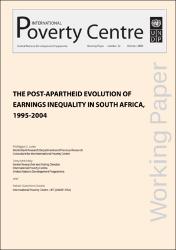Please use this identifier to cite or link to this item:
https://repositorio.ipea.gov.br/handle/11058/15850Full metadata record
| DC Field | Value | Language |
|---|---|---|
| dc.contributor.author | Leite, Phillippe G. | |
| dc.contributor.author | McKinley, Terry | |
| dc.contributor.author | Osorio, Rafael Guerreiro | |
| dc.date.accessioned | 2024-10-04T00:10:19Z | - |
| dc.date.available | 2024-10-04T00:10:19Z | - |
| dc.date.issued | 2006 | |
| dc.identifier.uri | https://repositorio.ipea.gov.br/handle/11058/15850 | - |
| dc.description.abstract | This paper examines the trend in post-Apartheid earnings inequality in South Africa. By combining data sets, the paper is able to analyze the trend for the whole period 1995-2004. Earnings inequality rose sharply during 1995-1999 and then declined marginally, but remained high, during 2000-2004. A dramatic rise in unemployment was the driving force in exacerbating earnings inequality in the 1990s. Unemployment began to level off in the 2000s but remained at a high rate. An unprecedented influx of new entrants into the formal labour market in the 1990s put downward pressure on average real wages, affecting workers both in the middle of the distribution and toward the bottom. The growth of the South African economy has been neither rapid enough nor employment-intensive enough to absorb such a large influx of workers. Moreover, the economy’s greater openness to trade and financial flows appears to have left many workers behind, especially Africans, workers in low-skilled occupations, residents of rural areas in general and poor regions in particular. Earnings inequality remains high across groupings of workers differentiated by race, education and occupation although occupation has become a more important factor than the other two in the 2000s. Differentials across the mean earnings of workers classified by rural and urban residence and by province have also intensified. In the 1990s, inequalities within groupings of worker rose sharply and then moderated by the 2000s. While earnings differentials by race and the rural-urban divide also exacerbated inequality in the 1990s, they have been in modest decline since then. These changes in the dynamics of earnings inequality between the 1990s and 2000s pose new challenges for South African policymakers in their efforts to substantially reduce the Apartheid legacy of high inequality and poverty. | en |
| dc.language.iso | en | |
| dc.title | The Post-Apartheid Evolution of Earnings Inequality in South Africa, 1995-2004 | en |
| dc.type | Working Paper | |
| dc.rights.holder | International Policy Centre for Inclusive Growth | |
| dc.rights.holder | United Nations Development Programme | |
| dc.location.country | Brasil | |
| dc.description.physical | 34 p. : il. | |
| dc.rights.type | Licença total exclusiva | |
| dc.rights.license | O texto e dados desta publicação podem ser reproduzidos desde que as fontes sejam citadas. Reproduções com fins comerciais são proibidas. | |
| dc.subject.keyword | South Africa | |
| dc.subject.keyword | Income distribution | |
| dc.subject.keyword | Earnings distribution | |
| dc.subject.keyword | Inequality | |
| ipea.access.type | Acesso Aberto | |
| ipea.researchfields | N/A | |
| ipea.classification | Demografia. População | |
| ipea.classification | Economia. Desenvolvimento Econômico | |
| ipea.classification | Sociedade. Participação Social. Controle Social | |
| Appears in Collections: | Publicações do IPC-IG | |
Files in This Item:
| File | Description | Size | Format | |
|---|---|---|---|---|
| en_IPCWorkingPaper32.pdf | 321.17 kB | Adobe PDF |  View/Open |
Items in DSpace are protected by copyright, with all rights reserved, unless otherwise indicated.

